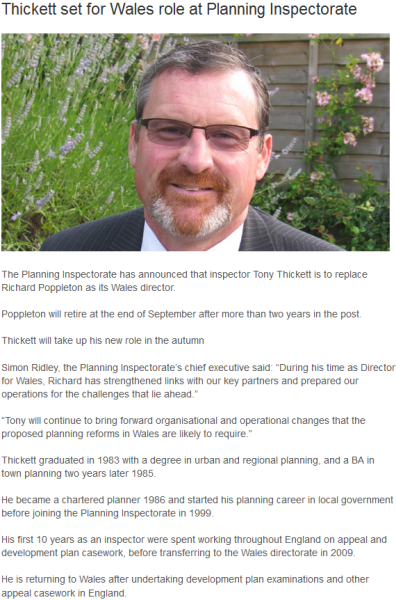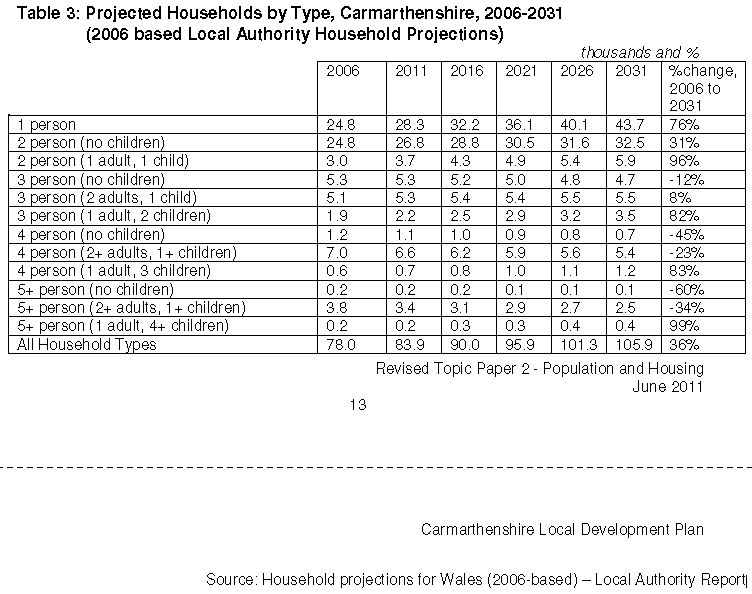After just over two years as head of the Planning Inspectorate in Wales Richard Poppleton is to leave. I have written about Mr Poppleton a couple of times in the recent past; first, on December 30 last year in Richard Poppleton, ‘Organ Grinder’, an d again on April 1 this year with Richard Poppleton, On Tour. Seeing as he took up his position as recently as April 2012 this is a rather early – and indeed, sudden – departure. Is he retiring, being re-assigned, or recalled to
d again on April 1 this year with Richard Poppleton, On Tour. Seeing as he took up his position as recently as April 2012 this is a rather early – and indeed, sudden – departure. Is he retiring, being re-assigned, or recalled to Berlin London?
I took an interest in Poppleton and his agency for two reasons. First, I wanted to know why the Planning Inspectorate forces through Local Development Plans that demand new housing in excess of local need. Second, I hoped to establish the relationship between the ‘Welsh’ Government and the Inspectorate. The first question is answered below. As for how the buffoons down Cardiff docks interact with the Planning Inspectorate, well, the reality is that the Planning Inspectorate is an Englandandwales outfit and an executive agency of the Department for Commuities and Local Government in London.
The Inspectorate operates in Wales on orders from the DCLG; the only contribution from ‘Welsh’ ministers is to nod in agreement when required, and to read from scripts prepared for them by the Inspectorate’s apparatchiks and other English civil servants. Summed up in this clip from the Gov.UK website entry for Mr Poppleton. The website clearly says ‘Director of Wales, Planning Inspectorate’; not ‘Director, Welsh Planning Inspectorate’; not even ‘Director, Planning Inspectorate Wales’. Clearly, he runs the Wales office for the Planning Inspectorate in London. Anyway, Poppleton is history, he will soon be replaced by another English civil servant.
*

When I heard the name of his successor, Tony Thickett, it rang bells, so I started searching through my blog, and sure enough, I found him. On March 13, in my post, Bodelwyddan and the Bigger Picture, Thickett’s name emerges as the planning inspector responsible for forcing through the Denbighshire LDP. I urge you to read the blog post and the planning inspector’s report, especially pages 16 – 27, ‘Housing; Need and Supply’, pages 28 – 31 ‘Affordable Housing’ and page 35 where, under ‘Other Matters’, the Welsh language, social and cultural fabric is dealt with.
For those who don’t have the time . . . The council argued, quite correctly, that the 2011 Census and other recent figures had superseded the original LDP and clearly indicate that Denbighshire now needs to plan for fewer new dwellings. Thickett’s response was, in effect, ‘Yes, quite right . . . but we are pushing ahead with the original figure anyway, so shut up!’ In the original LDP there had been provision for 2,250 – 3,000 ‘affordable homes’, but Thickett believed that “around 1,874 affordable homes could be delivered”. On the Welsh language, he made it clear that in his opinion it didn’t really count for anything.
Thickett was accompannied on his excursion to Denbighshire by a Gwynedd Thomas, another planner, obviously Welsh, but clearly outranked by Thickett. How does Gwynedd Thomas feel about being used to give a little local colour to this squalid exercise in colonialism?
More information on Thickett can be found in the panel on the right (click to enlarge) it comes from planningresource.co.uk. Note the announcement was made by the Planning Inspectorate, not the ‘Welsh’ Government. Though I find it strange that this press release, taken from the GOV.UK website, should imply that the appointment means Thickett is “returning to Wales” – where the hell is Denbighshire?
*
Thickett’s work in Denbighshire, his report that says, ‘We can do whatever we damn well like, no matter what the evidence and statistics say’, is a warning of what is to come, especially when two new pieces of legislation are enacted: the Planning (Wales) Bill and the Housing (Wales) Bill.
For those who have not been following my countless posts on this new legislation, let me quickly bring you up to speed. The housing bill is, basically, a load of flim-flam for the Left about looking after gypsies and regulating private landlords, yet the main purpose is to integrate social housing allocation in Wales with that in England. Which will mean that a deliberately homeless family of scruffs with no connections with Wales whatsover could be moving to a property close to you in the very near future. (Yeah, I know it already happens but, believe me, when the new legislation comes into force, the floodgates will be opened.)
The changes to the planning laws have been welcomed by builders, developers, estate agents and even lower forms of life not discussed in polite society. Development plans will cover larger areas than the existing local authorities and councillors will be squeezed out to give more power to council officers (too many of whom are not Welsh) and ‘appointees’. Taking power away from Welsh councillors is something I would normally applaud, but a return to the quangoes – which is what the Bill advocates – cannot be supported. The basic reasoning of the new legislation is that planning should be left to the professionals with as little input as possible from those who will be affected by the decisions made by these professionals.
laws have been welcomed by builders, developers, estate agents and even lower forms of life not discussed in polite society. Development plans will cover larger areas than the existing local authorities and councillors will be squeezed out to give more power to council officers (too many of whom are not Welsh) and ‘appointees’. Taking power away from Welsh councillors is something I would normally applaud, but a return to the quangoes – which is what the Bill advocates – cannot be supported. The basic reasoning of the new legislation is that planning should be left to the professionals with as little input as possible from those who will be affected by the decisions made by these professionals.
To whet your appetites further, I have included an illustration (click to enlarge) taken from a paper by Nathaniel Lichfield & Partners published in December 2013, to help their clients understand Strategic Development Areas in Wales. You will see that our two main cities are shown, presumably as the hubs of their planned city regions (yawn!), but what is that red gash snaking across the north from the border to end in a blob somewhere near Bryngwran? It is described as “the A55 Corridor”, and can only be a commuter corridor . . . not for northern Welsh people to work over the border, but to facilitate the movement into Wales of English people already working over the border, for which thousands and thousands of new homes will be built. (I added Bodelwyddan to the map to help you get the fuller picture.) All this, remember, before the legislation is even passed. The vultures are circling!
You must not think that this is confined to Swansea, Cardiff and the north, for the whole country is under threat, as Cneifiwr recently reminded us with another illuminating post from Carmarthenshire. There, despite the most recent statistics making it clear that population increase will be far lower than previously anticipated by the LDP, and household size (across Wales) larger than predicted, the number of new dwellings planned for has actually been increased! Then, further mirroring Denbighshire, the number of affordable homes to be built in Carmarthenshire has been reduced. Even attitudes towards the language follow the Denbighshire lead; protection for the language will now apply only to those communities where more than 60% of the population speaks Welsh, of which there are just five left. How can the Planning Inspectorate and council planning officers (invariably operating in concert) say, ‘Yes, we agree, the demand for new housing has reduced . . . so we’re going to build even more new houses!’.
*
The only answer to that question is that housing in Wales – private and social – has little to do with what we Welsh need. Housing is now quite blatantly being used to increase the English population of Wales and thereby weaken Welsh identity, done in order to reduce the demand for further constitutional change. Then Wales can, to all intents and purposes, be assimilated into England . . . even if the pretence of ‘Wales’ is maintained in sport and other ‘bread and circuses’ spheres. The English Planning Inspectorate is a major player in this ethnocidal strategy. As are the other civil servants, with their hands up the backs of the dummies in the ‘Welsh’ Government, making these wretches say whatever London wants them to say.
We Welsh are on the point of becoming a minority in our own country. This trend has been observable for almost half a century, unsurprising because it began in response to the national awakening of the 1960s. It takes in not just housing, but higher education, the Third Sector, tourism, discrimination in employment, lack of training opportunities, reducing funding to Welsh farmers, highly selective grant funding, the ‘managed decline’ of the Valleys and other areas . . . in short, anything that can be used to disadvantage, sideline and minoritise us Welsh. Others see it, and comment on it without inhibition or sense of guilt; but we Welsh must not discuss it – for to do so makes us ‘racist’. The great taboo subject of contemporary Wales! Compared to this threat to our very existence as a nation nothing else matters: not fracking, not M4 ‘improvements’, not saving the planet, and we certainly shouldn’t concern ourselves with which set of puppets is on stage down Cardiff docks.
Organising an effective resistance to the colonisation strategy cannot be done overnight. Remember that our enemies have taken forty years and more to get to the position they are in today. But the resistance must start with people talking to each other, for there are too many groups and individuals scattered about the country achieving very little because they are precisely that – disparate and dispered groups and individuals. So start putting out feelers, talk to each other, look for common ground, start co-operating, with the aim of finding candidates to give the electorate a clear nationalist alternative on the regional lists in the Assembly elections of 2016.
I advocate this because more important than all the groups and individuals I refer to are the many thousands who have lost faith in the established parties. Many of these were so desperate to show their contempt for the Lab-Con-LD-PC cabal that they voted in large numbers – even in the Valleys! – for the clowns, cretins and crooks of Ukip on May 22. Provide a rallying-point for these who have lost faith and it will be rewarded. Make the elections of 2016 the springboard for a new movement that will start reclaiming our country!









 the period of 2.12
the period of 2.12











